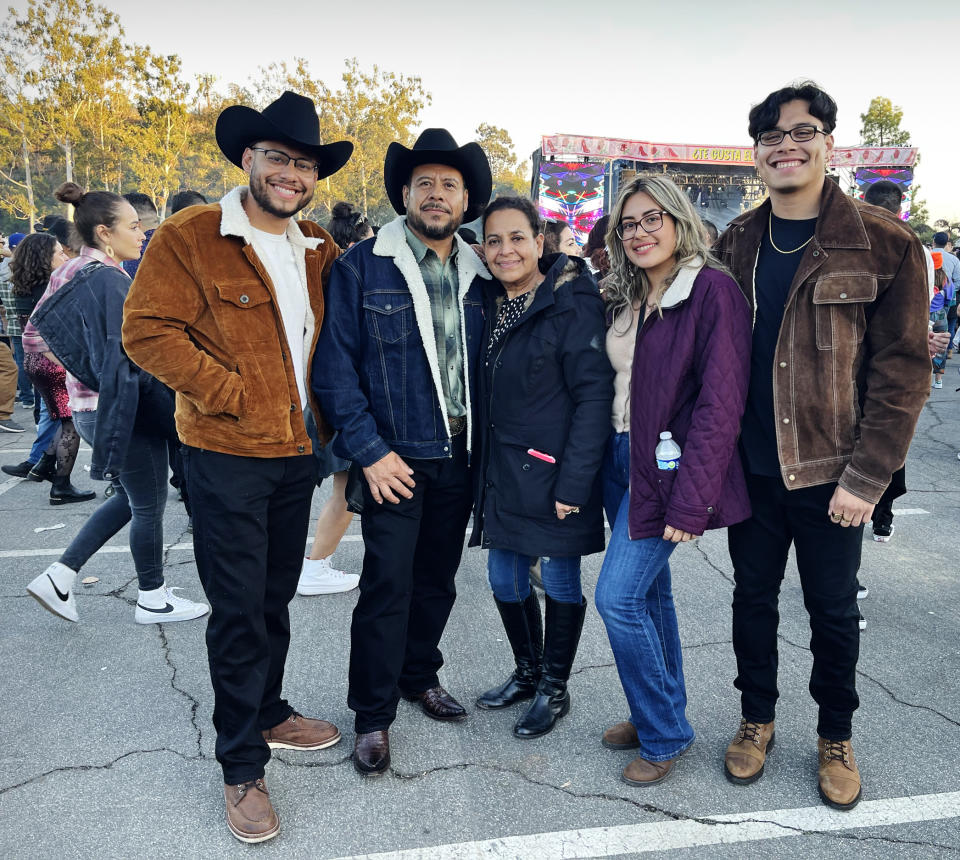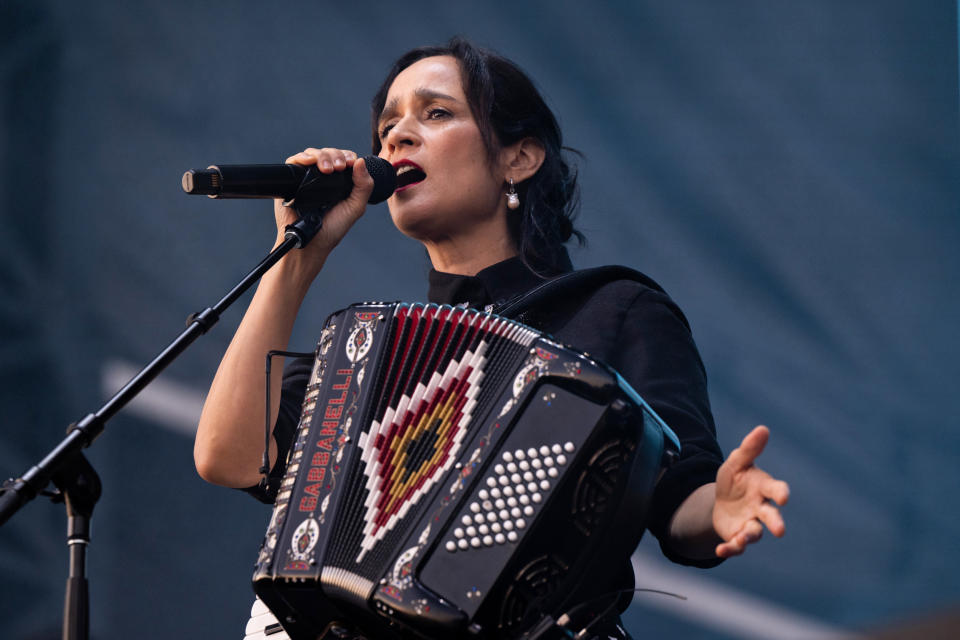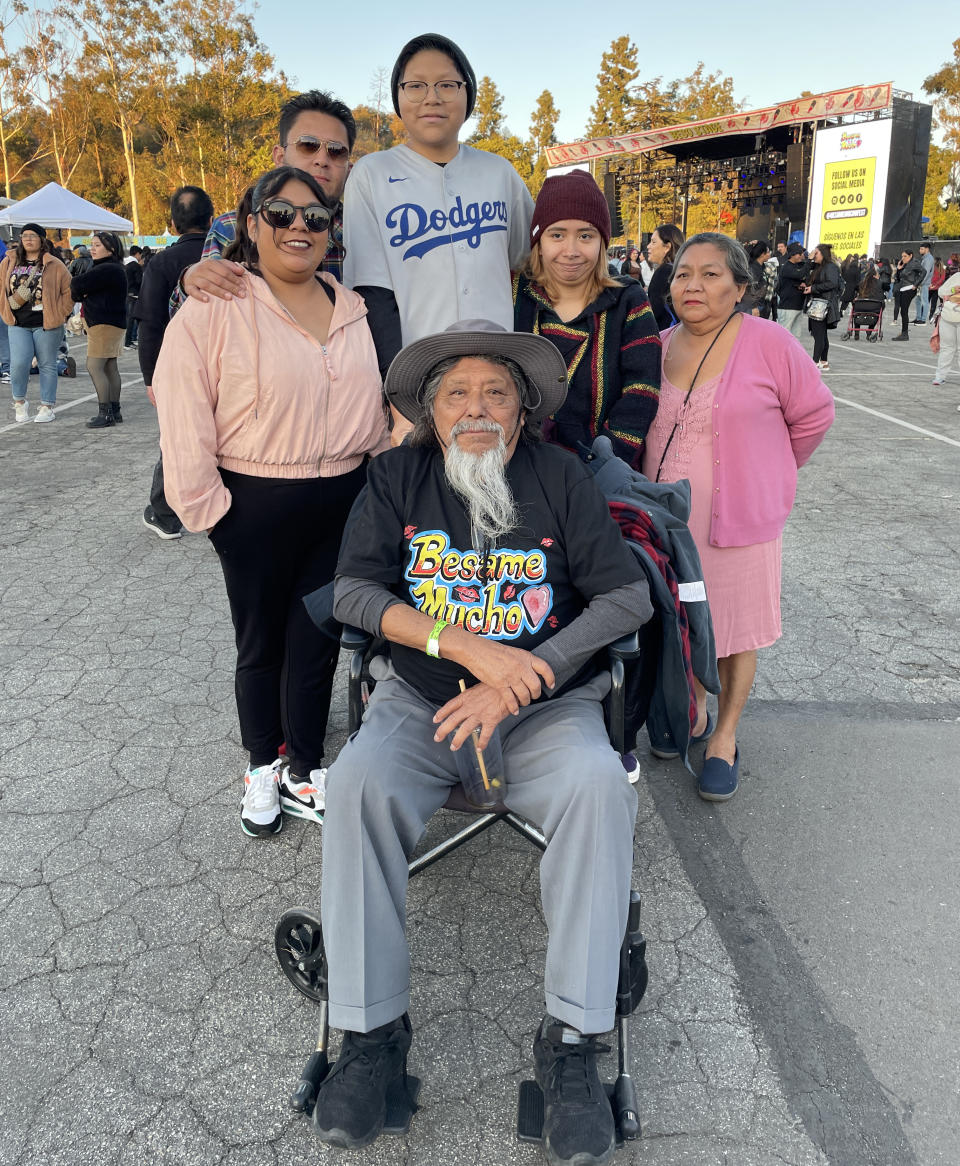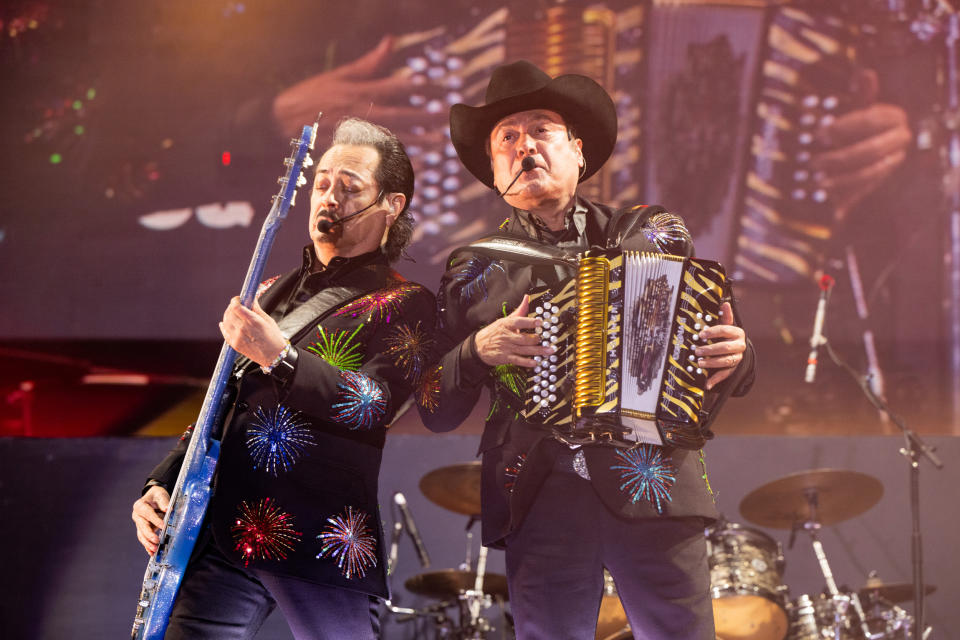Why an LA music festival created a cultural moment spanning generations
LOS ANGELES — The Martinez family had never attended a concert together. This year, Oscar, Christian and Brianna Martinez surprised their father and mother with tickets to the inaugural Bésame Mucho Festival, a birthday present for their dad.
"These are bands that me and my dad listened to when we were at work — so it's fitting to bring him, to finally see them live," said Oscar, 25, who was wearing a matching black Tejana, or cowboy hat, with his father. "I thought it'd be perfect."
The sold-out, one-day festival, produced by Live Nation and held Saturday at Dodger Stadium, brought together 58 Latin music artists across various genres, including rock, pop, salsa and Mexican regional music and spanning decades, from the 1960s to the 2000s.
Tickets quickly sold out when they were made available in February. The festival's popularity is rooted in nostalgia and its connection to the Spanish language.

“I think that people take pleasure out of identifying with Spanish, having music that they feel speaks directly to them — even if they’re not Spanish dominant,” said Ed Morales, an author and lecturer at Columbia University’s Center for the Study of Ethnicity and Race.
Oscar's older brother Christian, 26, who had more of a rocker vibe and was decked in black jeans, a black T-shirt and piercings, said the festival was perfect for the family.
"We can hop from one genre to another," he said. "Some of us relate to one a little bit more than another, but ultimately, you know, it's music. It's one of the things that brings us all together."
2021 was a record year for Spanish-language music. The Mexican grupera (a form of regional music) band Los Bukis became the first Latin music band to sell out two shows at the 70,000-seat SoFi Stadium. Puerto Rican trap-reggaetón superstar Bad Bunny's latest album, “Un Verano Sin Ti,” earned two Grammy Award nominations this year, including the first Spanish-language album to be nominated for album of the year and the first Latin artist named as Apple Music’s artist of the year.
Latinos account for 54% of the nation's overall growth in the last 20 years, reaching 62.5 million in 2021, or 19% of the total population, according to a recent study by the Latino Policy and Politics Institute at the University of California, Los Angeles.
The festival’s Spanish-language dominance was a big marketing tool, Morales said, adding that the concert’s popularity also reflects the country’s demographic changes.
Puerto Rican Merengue singer Elvis Crespo, whose career has spanned over two decades, has seen Latin music's changes and growth. He's experienced how different generations create cultural moments — most recently through the viral videos of "Wakanda Forever" actors dancing to his hit “Suavemente,” as well as Bad Bunny’s homage to Crespo's music video in his own music video for his song, “Neverita.”
“I feel really grateful to be able to live this moment,” Crespo said in an interview at the festival. He believes music can transcend language barriers, recalling sneaking out as a teen to attend disco parties playing English-language songs.
“I didn’t understand, but the melodies captivated me," said Crespo. "That’s what I see with Latin music — it makes me feel very proud.”
The pop-rock indie artist Julieta Venegas, a pioneering American-born Mexican singer, songwriter and instrumentalist, sings in Spanish.
“I feel that today is a day to feel pride, to be proud that you are Latino,” said Venegas about the festival. “It demonstrates the variety and diversity of the music that we have.”

Yunuen Bonaparte, 33, flew in from Brooklyn, New York, to attend the festival.
“It was a perfect lineup, it really hit a chord, it almost felt like it was made for me,” said Bonaparte, who said she left feeling inspired after seeing the attention to detail from Latino food vendors, a Lucha Libre performance and culturally relevant decorations created by the designer Ricardo Soltero, who has served as artistic director at the iconic Hollywood Forever Cemetery’s Día de Muertos celebration. “I don’t think it has ever happened before where you can take your parents to this huge festival to see their favorites and then you can also see your favorites.”
Throughout the day entire families were visible at every stage.
The magnitude of generational diversity could be seen when the Grammy award-winning Mexican band Los Tigres del Norte were on stage. One could spot people in the crowd video-calling their parents so they wouldn’t miss a song.
Pedro May, 22, a Los Angeles native, purchased the tickets for his parents. He pushed his dad’s wheelchair toward “The Beso Stage,” to hear La Sonora Dinamita play cumbias, a musical genre in Latin America dating to the 1800s, with roots in Colombia’s African culture.
“We are having a beautiful time together," said Pedro's father, Edmundo May, 78, from Nayarit, Mexico. "My children gave me this gift so that I could have fun. I am old, but that doesn’t matter, I love music of all types.”
In the “Las Clásicas” stage, older festivalgoers reminisced while listening to the Venezuelan band Los Terrícola’s “Te Juro Que Te Amo” ("I Swear I Love You"). Later in the evening, large crowds sang and danced along to Mexican Norte?o artist Ramon Ayala y Los Bravos del Norte’s song “Tesoro" ("Treasure").

More streaming, a larger Latino playlist
Overall, the Latin genre saw a significant shift in 2022, largely fueled by Bad Bunny’s album “Un Verano Sin Ti.” Latin music surpassed country, making it the fourth most popular genre in the U.S.
Latin audio streams saw a 33% increase, according to Luminate’s 2022 Midyear Music Report.

"Before, we really were invisible,” said Leila Cobo, a renowned Latin music expert and Billboard’s vice president of Latin content. Streaming's increased accessibility has removed major barriers of entry for Latin music, Cobo said, allowing audiences of different generations to connect with artists in several languages and helping usher in new types of concerts and music festivals.
Rather than one artist, she said, it's a playlist for Latinos of all ages.
Before it was always the parents and the kids going to see different kinds of music, according to Cobo. "Now I think the kids go to see their parents’ music and Bad Bunny."
Este cartel es tan BRUTAL que no me la creo ???? Amén y que SEA YA @besamemuchofest pic.twitter.com/2IcTzvbAa5
— JUANES (@JUANES) February 16, 2022
As he closed out the festival, the chart-topping Colombian singer and songwriter Juanes reflected on the day and shared with the audience how it was also special for him to hear bands that he grew up with and admires, such as Café Tacvba and Los Tigres del Norte.
"It is a huge honor to be here," Juanes said.
This article was originally published on NBCNews.com
